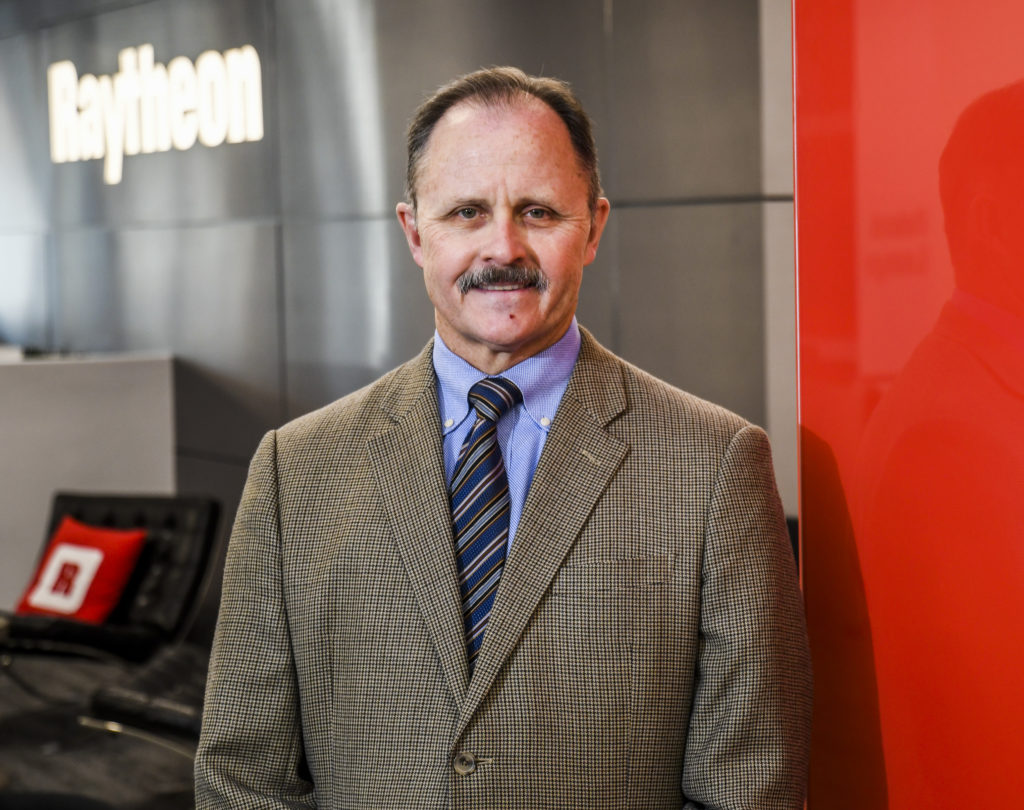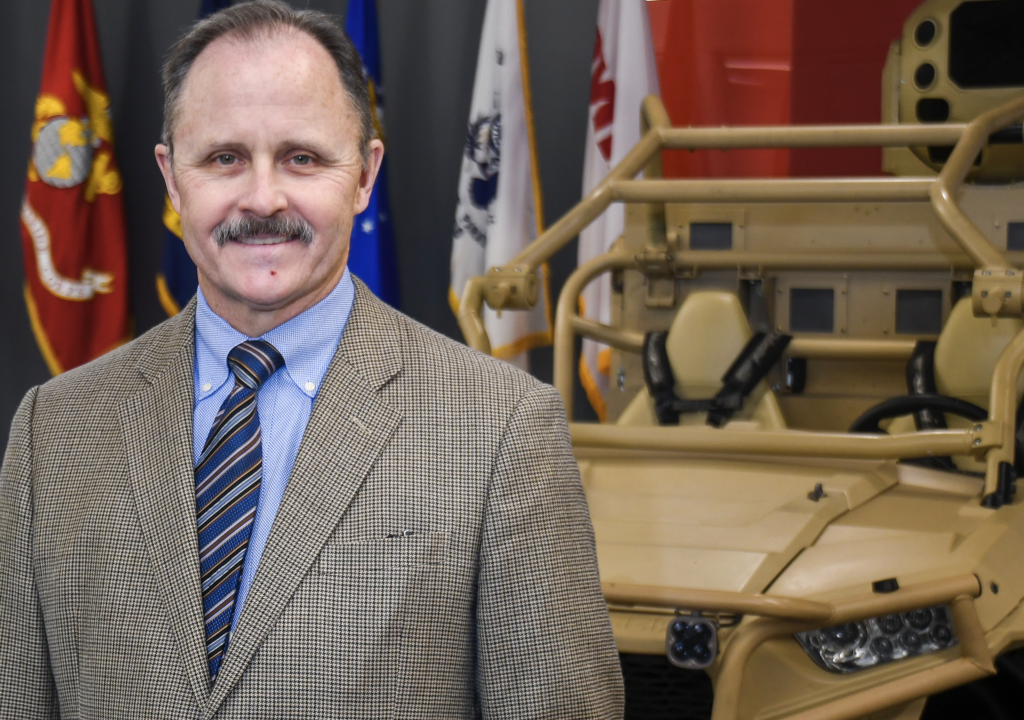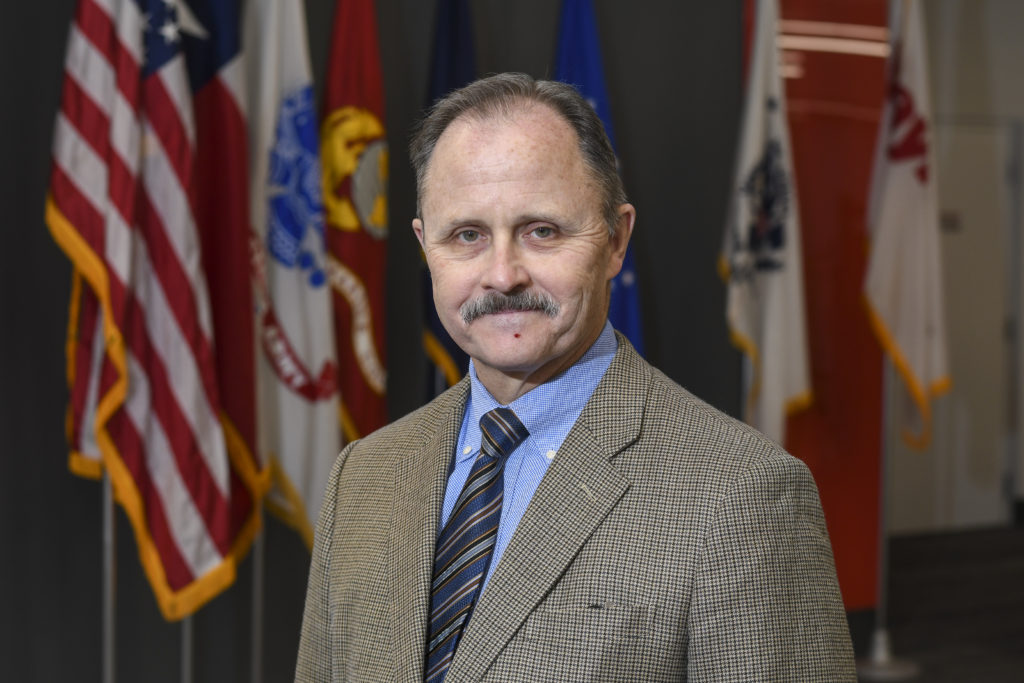
Jeffrey Hunt had just finished college at California Polytechnic State University and considering law school when he talked with a Navy officer programs recruiter in San Francisco about the Navy Reserves and one day joining the Judge Advocate General’s Corps.
“Have you ever thought about flying Navy jet fighters?” the recruiter asked.
“Who wouldn’t,” Hunt responded.
Later that year, he was at the Navy’s flight training school in Pensacola. Two years later, earned his Navy wings at the Naval Air Station in Corpus Christi.
“It was a little bit different than law school,” he says.
In the three decades since, Hunt served 21 years in the Navy and a dozen years as a lawyer in the Raytheon Space and Airborne Systems corporate legal department.
For three years, he was a Navy pilot flying a E-2C Hawkeye tactical early warning aircraft and other planes that had numerous “interactions with the Soviets” and a few harrowing experiences landing in severe weather conditions on a Nimitz-class supercarrier at sea. For 14 years, he served in the Navy JAG Corps – from handling highly sensitive military matters around the world to representing a female combat helicopter trainee in a nasty, high-profile legal dispute with the Navy.
For the past dozen years, Hunt has been senior counsel at Raytheon Space and Airborne Systems (SAS), where he has handled military contracts worth hundreds of millions of dollars, guided the global defense contractor through the labyrinth of laws in the European Union required to open an operational support center in Germany and was the lead lawyer for the company’s intelligence, surveillance and reconnaissance systems product line.
“I think that bringing an airplane aboard a ship at sea, particularly at night, is one of the most challenging things that a person can accomplish – it certainly was for me.”
Hunt led the creation of an annual international event that brings Raytheon leaders from around the world together to discuss critical compliance and ethics issues and has been a key leader in the implementation of the 2019 merger of Raytheon and United Technologies Corporation, which will make it the world’s second largest aerospace and defense company.
“Jeff is a consummate legal professional who not only manages legal issues as they come to him but proactively engages with his many in-house Raytheon clients to foresee and mitigate potentially expensive and time-consuming legal issues that arise out of Raytheon’s far-reaching worldwide business activities,” says Raytheon SAS General Counsel Sean Sabin.
“Jeff is a natural born leader and it shows,” Sabin says. “Jeff handles everything from negotiations with troublesome suppliers and regulatory matters related to agriculture activities on Raytheon’s property to complex litigation matters.”
Hunt is a finalist for the 2019 DFW Senior Counsel of the Year Award for a Midsized Legal Department.
The Association of Corporate Counsel’s DFW Chapter and The Texas Lawbook will honor the finalists and announce the winners of the 2019 DFW Outstanding Corporate Counsel Awards Jan. 30 at a ceremony at the George W. Bush Presidential Center and Institute.
“I’ve worked with a lot of in-house, but Jeff is the best at being extremely focused on the specific legal issue in question while also keeping the big picture in mind,” says Winston & Strawn partner Matt Orwig. “Jeff’s work involves such highly technical, sophisticated, important and sometimes classified matters, and he understands all of it and what it means to the legal matter at issue.”
Hunt’s expertise and experience as a Navy pilot provide him a practical insight that very few lawyers worldwide offer.
“Flying Navy airplanes requires an aviator to deal with the situation at hand, not the one you wish that you might have,” Hunt says. “We were often reminded that runway behind you, gas on the ground and altitude above you are of no use to an aviator in a difficult situation. Circumstances can be favorable or unfavorable, and a pilot is trained to do the best with what he or she has in hand at the time.
“I have learned that the same is true for a lawyer,” he says. “You must play the hand you’ve been dealt – good or bad. Frequently, a mix of both. Facts are facts and they will shape the range of potential outcomes for you and your client. A lawyer must be realistic with his or her clients while seeking to accomplish the best possible outcome in a given situation.”
Hunt was born and raised in the East Bay region of the San Francisco Bay Area. His father was an electrician at a papermill. His mother worked as a bookkeeper.
While a political science major at Cal Poly, a professor started “steering” Hunt toward law school.
But he also has a family history of military service – his father, grandfather, uncles and cousins served.

“I have a long, unbroken line of family members who have served in every conflict from the First World War through Gulf War II,” he says. “My grandfather, who was from Corsicana, was a member of the First Texas Cavalry that was nationalized and sent to France during WWI. One of my cousins recently discovered that we apparently have ancestors who served in the Continental Army during the Revolution and Union Forces during the Civil War.”
Hunt flew the Navy’s Hawkeye, a carrier-based airborne surveillance platform that holds a crew of five – two pilots and three naval flight officers who operate the sensor suite. Interestingly, Raytheon makes some of the parts for the Hawkeye’s early warning system.
“Flying around the aircraft carrier is a demanding, exciting and unforgiving experience,” he says. “I think that bringing an airplane aboard a ship at sea, particularly at night, is one of the most challenging things that a person can accomplish – it certainly was for me.”
Hunt remembers one particularly harrowing event during his first deployment in the Gulf of Alaska and the Bering Sea. He had to land his Hawkeye in treacherous weather conditions on the deck of USS Carl Vinson, which was involved in Operation Desert Strike and Operation Enduring Freedom. The Carl Vinson is also known for being the carrier from which Osama bin Laden was buried at sea in 2011.
“My executive officer and I landed a Hawkeye aboard the ship in weather when the carrier was operating too far from a land-based airfield to divert,” Hunt says. “Truthfully, I never really saw the boat until we rolled out in the wires. Definitely an E-ticket ride.”
In 1990, Hunt took advantage of a Navy-funded law program designed to encourage experienced Naval officers to join the JAG Corps.
During his three years at Vanderbilt University Law School, Hunt remained on active duty and was subject to being recalled if necessary.
Upon graduating and receiving his law degree in 1993, Hunt was assigned to the Navy JAG Corps.
His first big case landed on his desk only a few months later when he was assigned to represent Navy Lt. Junior Grade Rebecca Hansen, a helicopter pilot trainee who claimed that the Navy discriminated against her for filing a sexual harassment claim against her instructor.
Navy brass, according to reports, believed her story that the instructor harassed her, as he was disciplined and booted from the military.
But the Navy also rejected Hansen, claiming she was merely a marginal pilot. She was dismissed from the pilot trainee program with just 10 weeks left of the 18 months required. She claimed her low grades were revenge. The case received front page headlines in the Washington Post and New York Times. Congressional leaders got involved. There were multiple hearings.
“It was a unique experience,” Hunt says. “It was made clear to me that the Navy wanted her to be zealously represented. We visited Capitol Hill, met with the Secretary of the Navy – basically unprecedented kinds of meetings.”
Representing Hansen was basically his only case for more than a year and a half.
“In the end, Rebecca and the Navy decided to just part ways,” he says.
The Navy JAG gave Hunt several high-profile assignments, including time as the primary legal advisor to the U.S. military delegation to NATO in Brussels, which is comprised of an executive officer with the Navy’s prosecution command in Washington, D.C., a professor at the U.S. Naval Academy and lawyer for a Navy Carrier Battle Group Commander.
Hunt retired from Navy in 2007 as a commander.
“If I was leaving the Navy, I still wanted to do something that involved me in military matters,” he says.
Raytheon was the perfect place.
Sabin says Hunt is “the ultimate Swiss Army knife legal counsel who solves problems for his myriad and diverse internal clients, always with a smile and cheery attitude.”
During his 12 years with Raytheon, Hunt “has been the go-to legal counsel for SAS operations around the globe and ethics matters that occur at the SAS business,” says Sabin, who nominated Hunt for the award. “Jeff supported a host of domestic and international programs, including maritime surveillance radars, sophisticated electro-optical sensors, emitter locator systems and missionized aircraft.”
For several years, Hunt served as general counsel for a Raytheon subsidiary called Raytheon Deutschland, which is located in Freising, Germany, and supplies electronic sensor systems and flight radars for the air forces in Germany and other countries in Europe.
Sabin says that about five years ago Hunt “identified the need” for an annual international compliance meeting for Raytheon officials who handled business outside the United States. He said the program has been a huge success for Raytheon and “would never had existed but for Jeff’s perseverance.”
“The program is to ensure that everyone knows the updated laws on import and export and regulatory matters,” Hunt says.
Robine Grant, a partner at Winston & Strawn, says it is clear that his colleagues at Raytheon – lawyers and non-lawyers – depend on Hunt and trust him.

“He stands out from other in-house counsel in the amount of time and effort he puts into not only helping with legal issues that arise, but also in facilitating our relationship,” Grant says. “He has developed an unparalleled expertise during his storied career which he brings to the legal issues that we face in our work together. And he is quick to share his war stories and experiences, ensuring that each interaction we have is personal and meaningful.”
When it comes to community service, Hunt championed a relationship between Raytheon and ManeGait Therapeutic Horsemanship, a McKinney-based nonprofit that helps children and adults with disabilities move beyond their boundaries through the healing power of horses and the dedication of a professional and caring community. Thanks to Hunt, Raytheon is now a major supporter of ManeGait, especially riding programs that benefit veterans of the U.S. Armed Forces.
No matter the project, Hunt says he feels like his work at Raytheon is helping make those who serve in the military safer.
“I’m a roll-up-my-sleeves-and-get-to-work guy,” Hunt says. “I’m an intermediary between the business team, the engineers and our outside counsel. It’s a great job. I literally work with rocket scientists.”
